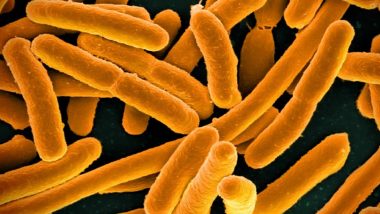London, June 7: Recently, an alarming surge in cases of E.coli infections has sent shockwaves through the UK, prompting urgent investigations by public health agencies. This bacterial outbreak, characterised by its potential to cause "severe bloody diarrhoea" and complications, has raised significant concerns about its origin, spread, and impact on public health. As health officials work diligently to contain the spread of this pathogen, understanding the nuances of E.coli, from its symptoms to its causes and treatment, becomes paramount for public health.
With over 113 confirmed cases reported since May 25, 2024, health authorities are mobilising resources to identify the source of contamination and implement measures to prevent further transmission. Amid this outbreak, questions arise about the nature and scope of the infection. This article aims to shed light on the complexities surrounding E.coli. Bird Flu Death in Mexico: First Case of H5N2 Virus Reported As Patient Dies After Contracting Rare Strain.
What Is E.coli?
Escherichia coli, or E.coli, is a diverse group of bacteria commonly inhabiting the intestines of humans and animals. While most strains of E.coli are benign, certain variations can trigger severe health complications, including debilitating gastrointestinal symptoms and, in rare instances, life-threatening conditions. The UK has reported a surge in cases of Shiga toxin-producing Escherichia coli (STEC), a strain of E.coli. Thyroid Disease: What Are Common Thyroid Symptoms? Why Women Should Prioritise Regular Thyroid Checkups.
Symptoms and Causes
According to a Cleveland Clinic report, the symptoms of an E. coli infection typically appear three to four days after exposure to the bacteria. The symptoms can range from mild to severe. Common signs include abdominal cramps, diarrhoea (often bloody), nausea, and vomiting. In severe cases, individuals may experience hemolytic uremic syndrome (HUS), a potentially life-threatening condition characterised by kidney failure, anaemia, and low platelet count.
E.coli infections are usually contracted through the consumption of contaminated food or water. Common sources include undercooked ground beef, raw milk, fresh produce, and contaminated water. Poor hygiene practices, such as inadequate handwashing after using the bathroom or handling raw food, can also facilitate the spread of the bacteria. The current outbreak in the UK is suspected to have been caused by nationally distributed food.
Treatment and Prevention
Treatment for E.coli infection primarily involves supportive care. This includes staying hydrated, as the body loses a significant amount of fluids through diarrhoea and vomiting. In severe cases, hospitalisation may be required to manage dehydration and other complications. Antibiotics are generally not recommended, as they can increase the risk of HUS.
Preventive measures are crucial to controlling the spread of E. coli. These include thoroughly cooking meat, avoiding unpasteurised dairy products, washing fruits and vegetables before consumption, and practising good hand hygiene, especially after using the restroom or handling raw food. Food safety protocols, such as proper food storage and handling, are essential to minimise the risk of contamination.
(The above story first appeared on LatestLY on Jun 07, 2024 01:56 PM IST. For more news and updates on politics, world, sports, entertainment and lifestyle, log on to our website latestly.com).













 Quickly
Quickly





















